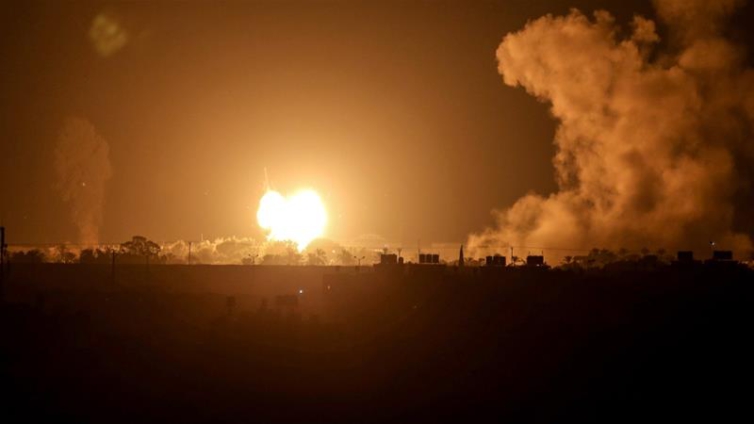The Gaza Strip could be on the brink of a new humanitarian crisis if supplies are not allowed in, authorities say, as Israel responds to the Hamas attacks.
On Monday, Israel declared a "complete siege" on the territory, saying electricity, food, fuel and water would be cut off.
According to residents, aid has not reached the enclave since Saturday.
BBC footage shows deserted streets covered with rubble from collapsed buildings following Israeli airstrikes.
Nearly 700 people have died in these attacks and thousands more are reported to have been injured.
The area is home to about 2.3 million people in total - 80% of whom rely on humanitarian aid mainly due to the ongoing hostilities with Israel.
It is ruled by Hamas militants but Israel controls the airspace and its shoreline. It also restricts who and what goods can cross its borders.
Neighbouring Egypt strictly controls what or who can pass through its border with Gaza too.
Since the attacks began on Saturday morning, Israel has stopped all supplies entering Gaza, including food and medicine.
Stéphane Dujarric, spokesman for the UN secretary-general, said more than a dozen healthcare workers had been killed or injured and at least seven medical centres had been damaged.
Meanwhile, many people are currently without electricity and internet, and could soon be out of essential food and water supplies.
"Damage to water, sanitation and hygiene facilities has undermined services to more than 400,000 people," said Mr Dujarric.
"The Gaza Power Plant is now the only source of electricity and could run out of fuel within days."
He added that the World Food Programme was already distributing food for up to 100,000 internally displaced Palestinians and that these efforts would increase eight-fold in the coming days.
Even before the latest restrictions, residents of Gaza already faced widespread food insecurity, restrictions on movement and water shortages.
Juliet Touma, a spokeswoman for the United Nations' Palestinian refugee agency (UNRWA), told the BBC people in Gaza were "terrified" by the current situation and worried for their safety - as well as that of their children and families.

On Monday, Israel's Defence Minister Yoav Gallant said it would impose a "complete siege" on the territory.
"No electricity, no food, no water, no gas - it's all closed," he said, adding that "we are fighting animals and are acting accordingly."
The Israeli infrastructure minister later ordered the immediate cut-off of water supplies to Gaza, saying: "What was in the past will no longer be in the future."
In a statement released before those announcements, the Palestinian health ministry said hospitals were facing a shortage of medicines, medical supplies and fuel due to Israel's actions.
It called on international actors to urge Israel to "restart power lines" and to supply emergency needs in the form of medicine, fuel and power generators.

Israel has launched massive retaliatory air strikes into Gaza in recent days. Sunday night saw a particularly heavy barrage of strikes, potentially the biggest Gaza has experienced in years.
Some of the strikes targeted the border area in the east of Gaza, from where Hamas launched their attacks on Saturday morning. Israel appears to be targeting those areas to try and shore up security there.
There have also been reports from witnesses of Israel using artillery fire in the border area.
Israel said it is striking Hamas targets in Gaza, but there are reports of civilians being hit.
The Palestinian Ministry of Foreign affairs said two refugee camps in Gaza - Al-Shati (also known as the Beach camp) and Jabalia camps - were hit by Israeli airstrikes, reportedly leaving several injured and dead.
Video shared online from Jabalia showed widespread chaos, including a body being carried away and a man covered in blood and dust.
The foreign ministry also said air strikes hit a United Nations school in Gaza that was housing hundreds of civilians, including children and the elderly.
The UN confirmed the attack, saying the school was "severely damaged", but that no one was killed.
There have also been reports of a mosque, as well as homes, being hit.
According to Associated Press, 19 members of the same family were killed in a strike in Rafah, in the south of Gaza.
The UN said on Monday 123,538 people in Gaza have been internally displaced, mostly "due to fear, protection concerns and the destruction of their homes".
The Office for the Coordination of Humanitarian Affairs (OCHA) added that 73,000 people are sheltering in schools.
Latest Stories
-
23 ambassadors inducted to take on 2025 GSTEP Challenge in three regions
5 mins -
Ghana Shea Workers Union inaugurated
13 mins -
I trust Bawumia; he has never lied to me – Akufo-Addo
22 mins -
Bawumia is hardworking; offers the youth platform to share ideas – Kow Essuman
24 mins -
IGP, Police commanders worship with churches in Ghana as part of security arrangements for 2024 elections
29 mins -
Mahama is a failed president; give Bawumia a chance – Akufo-Addo to Ghanaians
36 mins -
‘No child left behind in Free SHS’ – Akufo-Addo declares
49 mins -
MMDAs tasked to pay more attention to TB cases
51 mins -
2024/25 GPL: Defending champions Samartex suffer second consecutive loss as Basake Holy Stars wins 1-0
53 mins -
Government stands firm in Galamsey fight, says Akufo-Addo
58 mins -
National Peace Council assures public of violent free elections
1 hour -
Agenda 111 to be discontinued if NDC comes to power – Akufo-Addo
1 hour -
Mahama begins 3-day tour of the Western Region today
1 hour -
NCCE holds Parliamentary Candidates’ dialogue at Kumbungu
2 hours -
Akufo-Addo commissions new oil and gas services terminal
2 hours

